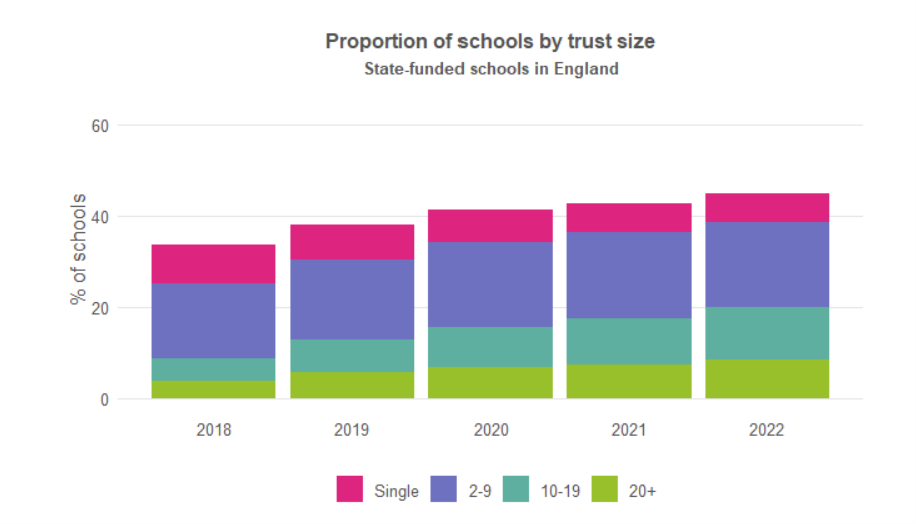In the second of two posts from this year’s Bett 2024 UK Edtech UK Summit, Rory Nath discusses the attractive opportunities for edtech providers to target multi-school contracts, but with a word of caution – only those with a strong product and excellent customer service will succeed.
The green shoots on multi-academy trusts as a primary focus for go-to-market
A perennial challenge for UK edtech has been customer acquisition costs attached to school-to-school selling. When I was asking edtech leaders about the sales environment this year, it was striking how frequently they were talking enthusiastically about selling at the multi-academy trust (MAT) level.
First, as a scene setter, the conversion of schools to academies continues to march steadily on, as does the growth in larger MATs. This is something I saw first hand during my tenure on the Board of STEP Academy Trust, where our family of academies grew from 14 to 20 over four years. Though it seems to be widely accepted that the Government’s target for all schools to join, or plan to join, a “strong trust” by 2030 will not be met, the direction of travel is well established. We don’t see any signs of this changing materially on the other side of this year’s election.

Source / credit: FFT Education Data Lab
Part of the philosophy of academisation is the standardisation of pedagogy and administration, as well as rationalisation of procurement at the trust level. Clearly, this creates attractive opportunities for edtech providers to address larger multi-school contract opportunities. The standard playbook for MAT selling is becoming well established. At its simplest level – win a cluster of schools within a trust, build strong advocacy and then upsell to the mothership. We have seen this approach be highly effective in a number of different product categories.
This is an exciting route to scaling up more efficiently for top tier products. However, with the number of providers now directly targeting MATs, this is by no means an “easy sell”. Procurement cycles can be long and expensive. We also think it will become increasingly the case that selling will be intermediated by MAT procurement frameworks.
So you need other strings to your bow. Maintained schools remain a significant part of the market, and local authority wide edtech procurement is also becoming more established. Outside of these larger formal contracts, informal school networks at the local level remain extremely powerful. Turning customer advocacy into real school-to-school referrals remains the lowest cost way to sell in this market. When we see it working well, it’s easy to recognise a valuable business – you can only get there with a strong product and excellent customer service.


